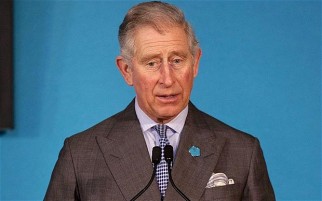The Prince of Wales is to launch a major international campaign to halt the destruction of the oceans through overfishing.

A report to be published this week by one of the Prince’s charities, the International Sustainability Unit (ISU), will say that fisheries around the world could be pulled back from the brink of collapse by tackling wasteful fishing practices.
In a speech at the report’s launch, the Prince will warn of “dire” long-term consequences unless action is taken to manage fish stocks more effectively.
He will use the opportunity to encourage governments, retailers and the fishing industry to adopt more sustainable practices, pointing to evidence that it could allow more fish to be taken from the seas rather than fewer.
The move comes on the back of the Prince’s campaign save the rainforests, which has been credited with having played a significant role in getting the international community to sign up to initiatives to tackle deforestation.
Campaigners fighting to stop overfishing and end destructive policies such as discards, where fishermen throw dead fish back into the sea to avoid exceeding quotas, have backed the Prince’s move.
While the Prince will not mention the European Common Fisheries Policy (CFP) in his speech, environmentalists who blame the policy for encouraging discards have welcomed his decision to speak out on the wider issues.
A Clarence House spokesman said: “The Prince of Wales has been concerned about the marine environment for many years.
“He wants to focus on the fishing industry and how to promote a more sustainable approach to managing the marine environment.
“The work of the Prince’s Charities’ ISU’s Marine Programme is about promoting sustainable approaches towards fisheries to preserve a long-term livelihood for the communities and industries that rely on them, to preserve the fish stocks, and to protect biodiversity and ecosystems in the sea.”
Twenty five per cent of the world’s fish stocks are now believed to be overexploited, depleted or recovering from depletion. Half of the world’s fish stocks are already suffering catches at or close to the limit that allows them to be sustainable.
The report by the ISU will be launched at an event hosted by the Prince at Fishmongers’ Hall in London on Friday, attended by 250 industry representatives and officials.
It will argue that the solution lies in readdressing the economics of fishing so governments and the industry recognise the benefits of preserving stocks.
It will highlight research that shows the oceans are capable of providing $50 billion (£31 billion) per year more value than they currently do if managed in an optimal manner.
Tony Juniper, special adviser to the ISU, said: “The automatic preconception that most people have is that sustainability is about taking less.
“What we have found, in fact, is that if fisheries were managed optimally then we could be taking more. The key to it is how you get the economics lined up.
“Then you can deliver value for the consumer, value for conservation and value for the fishing communities themselves to ensure they are rewarded for a hard job under tough conditions.”
The report will analyse ways to keep fish stocks healthy while also providing more fish for consumers. It will argue that reducing supply for certain species would raise market prices, allowing fish stocks to recover while giving fishermen the ability to continue making a living.
Fishing a more diverse range of species could also help to reduce pressure, while new technology could be used to reduce by-catch – unwanted fish that are caught up in nets – and return them to the ocean alive.
It will also suggest removing subsidies for building new fishing vessels and fuel, which could help to control the number of fishing vessels operating. Currently the EU provides £2 billion a year in subsidies.
The Prince, who has a long record of environmental campaigning, has previously backed attempts to reform the CFP and has described the issue of by-catch and discards as “immoral”.
Campaigners now hope that his international influence will persaude governments, regulating bodies, fishermen, seafood processors and retailers to adopt more sustainable fishing practices.
Hugh Fearnley-Whittingstall, the chef who led a campaign to change the CFP and is set to begin filming a third instalment of his Hugh’s Fish Fight programmes for Channel 4, welcomed the Prince’s involvement.
He said: “This is absolutely the right approach. If the world’s fish stocks were sustainably fished they could be more productive, not less.
“The Prince’s involvement in environmental issues has the ability to rouse political will and business commitment. It is extremely welcome that he is to continue to turn the spotlight on the problems and the solutions.”
A spokesman for the Marine Conservation Society said: “We welcome this approach of tackling the economics to incentivise sustainable fishing. It is something that will work and should appeal to governments no matter what their political persuasion.”